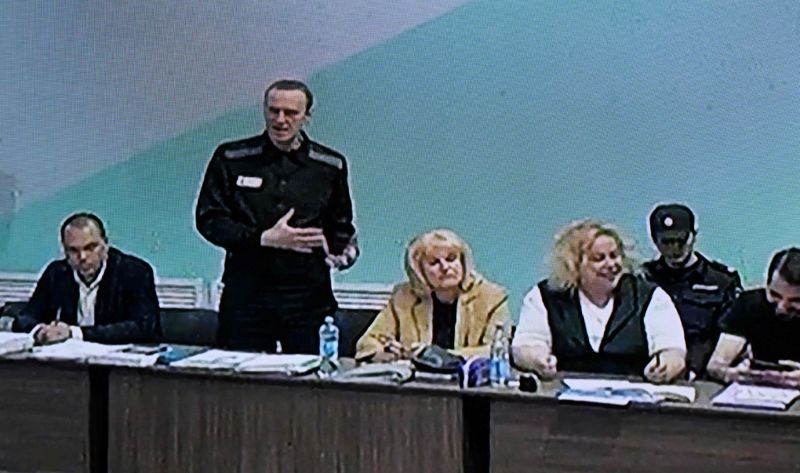Russian opposition leader Alexey Navalny is facing an even longer stint in jail after being sentenced to 19 years in prison on extremism charges, Russian media report, a fresh blow to a fierce critic of Russia’s President Vladimir Putin that comes amid an intensifying crackdown on dissent.
Navalny was accused of creating an extremist community, financing extremist activities and a number of other crimes.
He was found guilty on Friday at the high-security penal colony in which he has been detained.
Navalny is already serving sentences totaling 11-and-a-half years in a maximum security facility on fraud and other charges that he says were trumped up.
He and his supporters claim that his arrest and imprisonment were politically motivated, intended to silence his criticism of Putin.
The trial ended in June and took place behind closed doors at the IK-6 penal colony at Melekhovo, around 155 miles east of Moscow, where Navalny is being held.
The Kremlin critic said Friday that he is “serving a life sentence,” according to a statement on Telegram, and urged fellow Russians not to be intimidated.
“19 years in a special regime colony. The number doesn’t matter. I understand very well that, like many political prisoners, I am serving a life sentence. Where life is measured by the duration of my life or the life of this regime. The number from verdict is not for me. It is for you,” the post said.
“They want to frighten you, not me, and deprive you of the will to resist. You are being forced to surrender your Russia without a fight to a gang of traitors, thieves and scoundrels who have seized power. Putin should not achieve his goal. Don’t lose the will to resist.”
Friday’s verdict extends Navalny’s time in prison and raises further concerns about the brutal crackdown on Putin’s opponents that has been accelerated since Moscow’s invasion of Ukraine.
The former tech director of Navalny’s YouTube channel, Daniel Kholodny, was also sentenced to eight years in a penal colony, according to his lawyer, Svetlana Davydova in the independent Russian newspaper Novaya Gazeta.
A letter from Kholodny was also shared on the Navalny team’s Telegram channel Friday.
“Hi everyone, this is Danya Kholodny. I was sentenced to 8 years. You may ask what for? Turns out, connecting to a YouTube channel at the office is extremism … But that’s not all! 8 years isn’t long enough to be acquitted, so the court ordered that my property and money be confiscated. That’s what the prosecution asked for,” he wrote.
“It is important to understand: they condemned me not for being an extremist, because it is clear to a fool that there was no extremism, but so that you, horrified by my fate, would not think of fighting,” he added.
The European Union was quick to condemn Navalny’s sentence, saying it reiterated its “deep concern about reports of repeated ill-treatment, unjustified and unlawful disciplinary measures, and harassment amounting to physical and psychological torture by prison authorities against Mr Navalny.”
Navalny has been incarcerated in Russia since his return to the country in January 2021, on charges of violating terms of probation related to a years-old fraud case, which he dismisses as politically motivated.
There have been concerns about his wellbeing: Navalny lost weight and suffered stomach pain earlier this year, leading to fears among his lawyers that he had again been poisoned.
He had previously been taken from Russia to Germany in August 2020, after he was poisoned with the Soviet-era nerve agent Novichok. Navalny arrived comatose at a hospital in Berlin, following a medical evacuation flight from the Siberian city of Omsk.
The investigation also found that this unit, which included chemical weapons experts, had followed Navalny on more than 30 trips to and from Moscow since 2017.
Russia denies involvement in Navalny’s poisoning. Putin himself said in December 2020 that if Russian security services had wanted to kill Navalny, they “would have finished” the job.
Although the Russian authorities’ targeting of Navalny pre-dates Moscow’s invasion of Ukraine, the country has cracked down even more dramatically on internal opposition and free speech since launching the war.
An expanded and intentionally vague law on “foreign agents” came into effect late last year, requiring organizations and individuals engaging in political activity and receiving funding from abroad to adhere to draconian rules and restrictions.
Russia has also restricted access to Facebook, many Western news sites, and independent media in the country. Peaceful protests were quickly shut down and thousands arrested after Moscow’s invasion.
And the government has adopted a law criminalizing the dissemination of what it called “deliberately false” information about the Russian armed forces, with a maximum penalty is 15 years in prison.
Navalny has nonetheless been a vocal critic of the conflict. On the anniversary of the invasion in February, he called it “an unjust war of aggression against Ukraine under ridiculous pretexts.”
